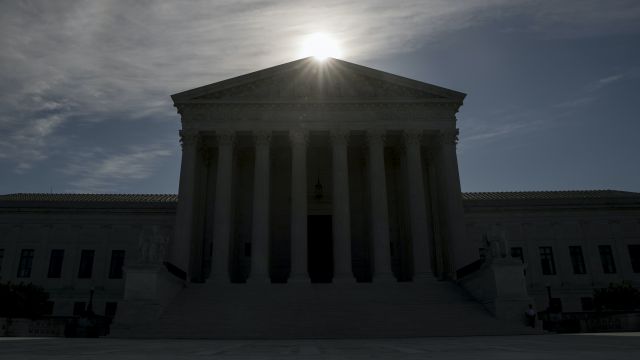With the court’s calendar already full through to the end of the year, the justices will not hear the case until 2021.
If Joe Biden were to win the presidential election in November and rescind the policy, the case would become largely moot.
Trump’s “Migrant Protection Protocols” policy, known informally as “Remain in Mexico”, was introduced in January 2019.

It became a key pillar of the administration’s response to an unprecedented surge of asylum-seeking families at the border, drawing criticism for having people wait in Mexican cities.
Lower courts found that the policy is probably illegal but earlier this year the Supreme Court stepped in to allow the policy to remain in effect while a legal challenge plays out in the courts.
More than 60,000 asylum seekers were returned to Mexico under the policy and the US Justice Department estimated in late February that there were 25,000 people still waiting in Mexico for hearings in US courts. Those hearings were suspended because of the coronavirus pandemic.
The Trump administration told the high court in April that the “programme has been extremely effective at reducing the strain on the United States’ immigration detention capacity and improving the efficient resolution of asylum applications”.
In a statement after the high court agreed to take the case, Judy Rabinovitz, a lawyer for the American Civil Liberties Union, which is challenging the policy, called the policy “illegal and depraved”.
“The courts have repeatedly ruled against it, and the Supreme Court should as well,” she said.

The high court also agreed to hear the Trump administration’s appeal of a lower court ruling that it improperly diverted money to build portions of the border wall with Mexico.
The high court has previously allowed construction to continue, even after a federal appeals court ruled in June that the administration had illegally sidestepped the US Congress in transferring 2.5 billion US dollars (£1.9 million) in Defence Department funds.
Dissenting from a July order that allowed construction to continue, Justice Stephen Breyer wrote that the court’s action “I fear, may operate, in effect, as a final judgment”.
The case has its origins in the 35-day partial government shutdown that started in December of 2018.
Mr Trump ended the shutdown after Congress gave him approximately 1.4 billion dollars (£1.1 billion) in border wall funding, but that was far less than the 5.7 billion dollars (£4.4 billion) he was seeking. Mr Trump then declared a national emergency to take cash from other government accounts to use to construct sections of the wall.
At the time, the money Mr Trump identified included 2.5 billion dollars in Defence Department money, 3.6 billion dollars (£2.8 billion) from military construction funds and 600 million dollars (£460 million) from the Treasury Department’s asset forfeiture fund.
The case before the Supreme Court involves just the 2.5 billion dollars in Defence Department funds.







